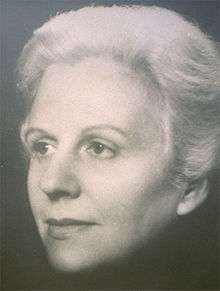Mercè Rodoreda
| Mercè Rodoreda | |
|---|---|
 Mercè Rodoreda | |
| Born |
October 10, 1908 Barcelona |
| Died |
April 13, 1983 (aged 74) Girona |
| Resting place | Romanyà de la Selva |
| Occupation | Novelist, Dramatist, Poetess |
| Language | Catalan |
| Notable works | The Time of the Doves, Mirall trencat, Aloma |
| Notable awards |
Premi d'Honor de les Lletres Catalanes (1980) Premi Joan Crexells de narrativa (1937) Mestre en Gai Saber (1949) |
| Partner | Armand Obiols |
| Website | |
|
www | |
Mercè Rodoreda i Gurguí (Catalan pronunciation: [mərˈsɛ ruðuˈɾɛðə]) (October 10, 1908 – April 13, 1983) was a Catalan novelist, who wrote in Catalan.
She is considered by many to be the most important Catalan novelist of the postwar period. Her novel La plaça del diamant ('The diamond square', translated as 'The Time of the Doves', 1962) has become the most acclaimed Catalan novel of all time and has been translated into over 30 languages. It is also considered by many to be one of the best novels published in Spain after the Spanish Civil War.[1]
Biography
She was born at 340 carrer de Balmes, Barcelona, in 1908. Her parents were Andreu Rodoreda, from Terrassa and Montserrat Gurguí, from Maresme.[2] In 1928, just 20 years old, she married her uncle Joan Gurguí, 14 years her senior, and in 1929 she had her only child, Jordi. She began her writing career with short stories in magazines, as an escape from her unhappy marriage. She then wrote psychological novels, including Aloma which won the Crexells Prize, but even with the success this novel enjoyed, Rodoreda decided to remake and republish it some years later since she was not fully satisfied with this period of her life and her works at that time.
At the start of the Spanish Civil War, she worked for the Generalitat de Catalunya, the autonomous Government of Catalonia.
She was exiled in France and later Switzerland, where in 1957 she broke her silence with the publication of her book Twenty-Two short stories, which earned her the Víctor Català Prize. With Camelia Street (El Carrer de les Camèlies) (1966) she won several prizes. In the 1970s, she returned to Romanyà de la Selva in Catalonia and finished the novel Mirall trencat (Broken Mirror) in 1974.
Amongst other works came Viatges i flors (Travels and flowers) and Quanta, quanta guerra (How much War) in 1980, which was also the year in which she won the Premi d'Honor de les Lletres Catalanes. During the last period of her lifetime, her works developed from her usual psychologic style to become more akin to symbolism in its more cryptic form.
In 1998 a literature prize was instituted in her name: the Mercè Rodoreda prize for short stories and narratives.
She was made a Member of Honour of the Associació d'Escriptors en Llengua Catalana, the Association of Writers in Catalan Language. The library in Platja d'Aro is named in her honor.
She died in Girona of liver cancer, and was interred in the cemetery of Romanyà.[3]
Most important works
- Aloma (1938)
- Vint-i-dos contes (1958)
- La plaça del diamant (The Time of the Doves) (1962)
- El carrer de les camèlies (1966)
- Jardí vora el mar (1967)
- Mirall Trencat (1974)
- Semblava de seda i altres contes (1978)
- Quanta, quanta guerra... (1980)
- La mort i la primavera, ("Death in Spring"; Rochester, NY: Open Letter Books 2009, ISBN 978-1-934824-11-5).
See also
References
- ↑ García Márquez, Gabriel (18 May 1983). "¿Sabe usted quién era Mercè Rodoreda?". El País (in Spanish). Retrieved 29 March 2014.
- ↑ tvcatalunya.com Archived July 8, 2008, at the Wayback Machine.
- ↑ Article in La Vanguardia of 1983/04/16
External links
| Wikimedia Commons has media related to Mercè Rodoreda. |
- Mercè Rodoreda in LletrA, Catalan Literature Online (Open University of Catalonia) (English) (Spanish) (Catalan)
- Mirror Play: Virtual Exhibition on Mercè Rodoreda
- Biography and reviews at escriptors.com
- Mercè Rodoreda at Open Letter Books
- A Domestic Existentialist: On Mercè Rodoreda by The Nation